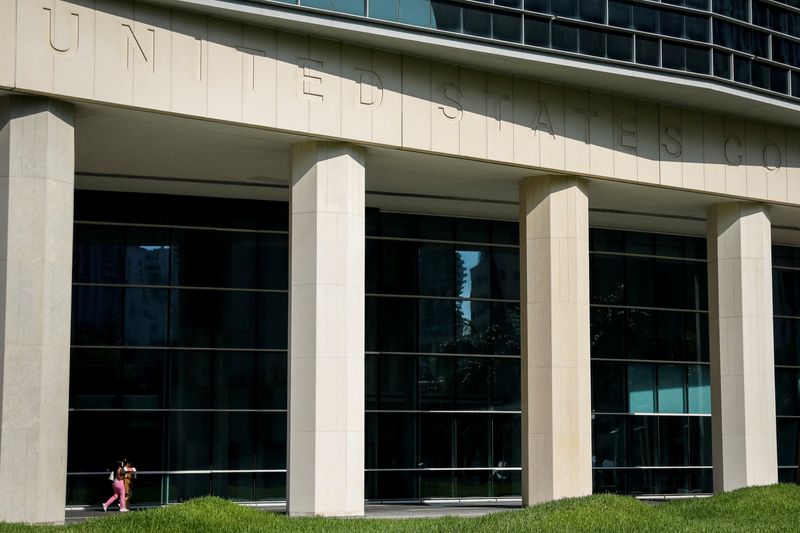US public defenders could lose hundreds of staff in budget shortfall-officials
2023.07.19 15:42

© Reuters. FILE PHOTO: People walk outside of the Wilkie D. Ferguson Jr. United States Courthouse in Miami, Florida, U.S., June 9, 2023. REUTERS/Marco Bello/File Photo
By Sarah N. Lynch and Richard Cowan
WASHINGTON (Reuters) – The U.S. federal public defenders system could need to cut as many as 500 from its staff charged with protecting the rights of poor criminal defendants, because of a budgeting error by Congress that could leave it with a 3% to 5% shortfall, officials said.
That would mean a reduction of as many as 12% of the roughly 4,100 employees of the Federal Public and Community Defenders, the office that represents indigent federal criminal defendants, who could in turn be left to spend more time in jail awaiting trial.
The agency has already been found to be understaffed: A 2022 independent judiciary commission study found the offices need to add at least 250 more people to handle current case loads, defenders told Reuters.
An appropriations bill moving through the Republican-led House of Representatives would reduce spending during the 2024 fiscal year beginning Oct. 1 for federal public defender services by about $42 million from its current $1.49 billion budget.
A version drafted by the Democratic-controlled Senate would lead to a nearly $71 million cut, federal defenders told Reuters in interviews.
The agency has already imposed a nationwide hiring freeze to brace for the cuts, according to a July 13 email seen by Reuters.
Officials warn the resulting layoffs and furloughs for public defenders, along with possible cuts and delays to payments to the 8,000 private court-appointed lawyers nationwide, would be of the magnitude experienced in 2013 when similarly-sized belt-tightening was imposed by Congress.
That year, the 87 chief judges of federal district courts warned the reductions had “a devastating and long-lasting impact” on the criminal justice system.
Democratic Senate Judiciary Committee Chairman Dick Durbin said he is aware of the budgeting problem and hopes to fix it before Congress settles on a final version.
“We are at risk of critically underfunding their constitutionally-mandated services,” he said in a statement to Reuters.
Without significant changes, the cuts would strain offices such as in Washington, D.C., where prosecutors have charged more than 1,000 people for the 2021 attack on the U.S. Capitol, and are expected to bring as many as 1,200 more cases, according to a letter from the D.C. federal prosecutor’s office to the court last year.
A spokesperson for the U.S. Administrative Office of the U.S. Courts, which oversees the Federal Public and Community Defenders, said it is assessing the impact of the proposed legislation.
The U.S. Constitution requires the appointment of a lawyer to criminal defendants who cannot afford one. Approximately 90% of federal criminal defendants qualify.
The defendants are “the most impoverished people who are very often the most marginalized and very often people of color,” said Melody Brannon, the top federal defender in Kansas.
Melanie Morgan, a Kansas lawyer whose firm does court-appointed work, warned that reduced or delayed payments for private lawyers might deter some from participating.
“We do it because we are true believers in the system, but it comes down to dollars and cents,” she said.
Attorneys and congressional sources said the budgeting error stems from unique circumstances related to the COVID-19 pandemic court closures and travel disruptions.
Those disruptions gave the defender services office an unusually large surplus of $111 million that carried over into 2023, contributing to an artificially low 2023 appropriation.
But Congress didn’t re-adjust that number for 2024, leading to the shortfalls in the two perspective bills.








